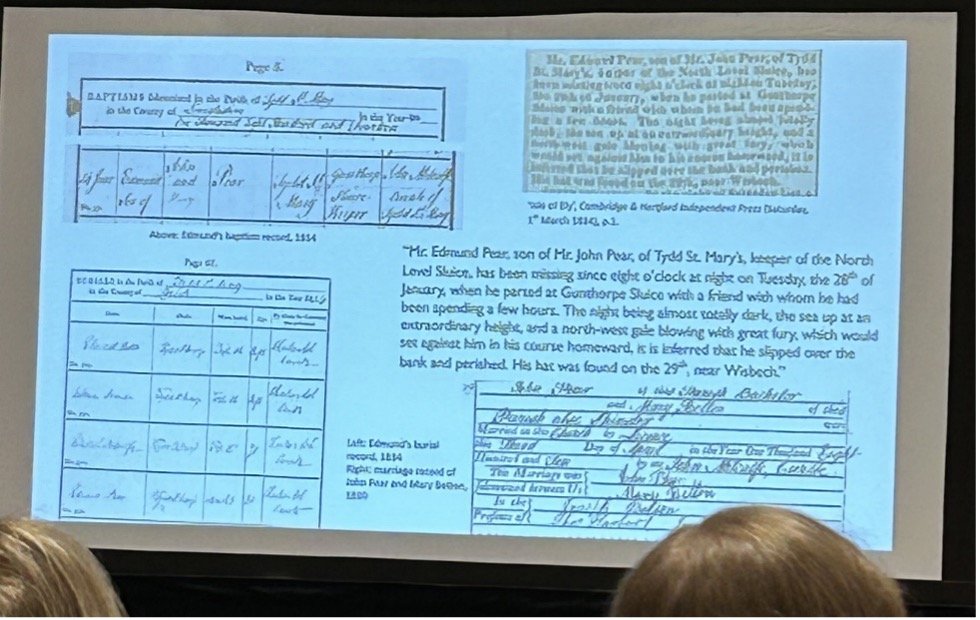K-SAA at MLA 2024: a summary of the panel “Disabling Environments” and the awards banquet
by Adam Neikirk
The Keats-Shelley Association of America participated in the 2024 MLA Convention in Philadelphia, PA through two events: a special session on “Disabling Environments in the Romantic Era,” and their annual Reception & Awards Dinner. I was lucky to be present for both!
Disabling Environments in the Romantic Era (January 5, 12:00—1:15 p.m.)
Organizer: Omar Miranda (pictured above)
Presider: Fuson Wang
Participants (left to right): Roseanna Kettle (University of York), Jane Kim (Biola University), Olivia Rosane (Independent Scholar), and Diana Little (Princeton University).
This session, which was organized by the K-SAA’s co-vice president Omar F. Miranda, invited four participants to present aspects of their research related to disability studies, Romanticism, ecocriticism, and the idea of the ‘environment’ broadly conceived. The first speaker, Diana Little, contended that Charlotte Smith’s poetry “articulates experiences of mental disability through the geologic character of Sussex.”
Little analyzed the sonnets of Charlotte Smith for imagery relating to Sussex’s “calcareous” (i.e. chalky or calcium-laden) soil.
The second speaker, Roseanna Kettle, discussed “The Commonplace Book of Edmund Pear,” a historical document from the early 19th Century that Kettle found in her own home. The photos below show a few pages of this fascinating book, which belonged to a young man named Edmund Pear. Blind and partially paralyzed from scarlet fever, Pear unfortunately drowned at the age of 20 due to coastal flooding.
Following Kettle’s presentation, Jane Kim analyzed “Emaciated Bodies in Yun Dong-Ju’s Poetry and in Mary Shelley’s Frankenstein.”
Kim focused on similarities between the image of the emaciated body in Mary Shelley’s Frankenstein, and the self-portrait conjured by Korean poet Yun Dong-Ju, who died in a Japanese concentration camp. Yun’s poem, entitled “My Liver,” is “haunted by the circumstances of his death,” merging “a Korean folktale of an infirm dragon king with the myth of Prometheus”—another Romantic connection.
Frankenstein’s emaciated body (pictured below) shows a “maternal imbuing of a lifeforce” to his creation. Kim left us with a similarly haunting question: “At whose expense are health and life achieved and maintained?”
Finally, Olivia Rosane examined “Enclosure as Disabling Force in the Poetry of John Clare.” Rosane argued that Clare identified enclosure in his poetry as a potentially “disabling force,” a phenomenon that was “physically and cognitively disabling for the people who can no longer move through the altered spaces.”
Of former “meandering footpaths,” John Clare wrote, “These paths are stopped.”
Reception & Awards Dinner (January 6, 6:30—10:00 pm at The Notary Hotel)
On Saturday night I attended the K-SAA’s annual Reception & Awards Dinner, a convivial event featuring a raffle, live music, a cash bar, and a dinner honoring the winners of the Pforzheimer Grant (Paul Stephens; Dianna Little), the Essay Prize (Lily Gurton-Wachter, “Reading By Firefly”), and two Distinguished Scholars, Deidre Lynch and Karen Swann. I’ll let the photos tell the story!
Raffle prizes on display
Award plaques. Keep an eye on the blog for more information on the winners and their projects!
Cocktail hour at the reception
The award banquet begins
To support K-SAA initiatives such as awards and prizes, the MLA dinner, and the annual Stuart Curran Symposium, consider purchasing or renewing your membership here. Keep an eye on the website and blog for upcoming events!
About the author: Adam Neikirk is a poet and scholar of British Romanticism with research interests in poetics and philosophy of literature. In 2023 he received his Ph.D. in Creative Writing from the University of Essex. Adam is an associate editor at Muscaliet Press and the Communications Officer of the Charles Lamb Society. He has published three books of poetry and his critical writings have appeared in the Coleridge Bulletin, Forum, and elsewhere.















